Unit 12 –Organisational Behaviour
VerifiedAdded on 2023/01/06
|15
|5236
|71
AI Summary
Contribute Materials
Your contribution can guide someone’s learning journey. Share your
documents today.
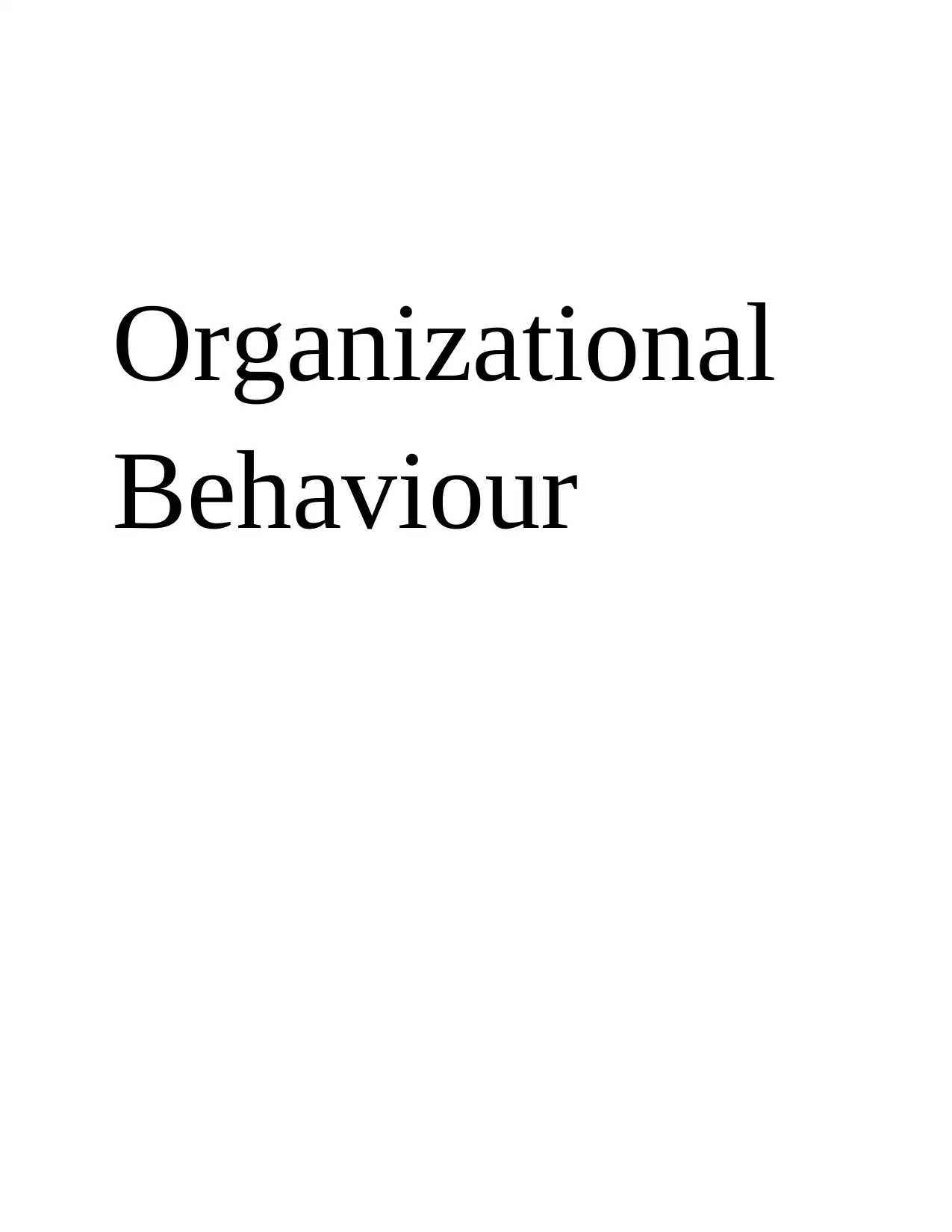
Organizational
Behaviour
Behaviour
Secure Best Marks with AI Grader
Need help grading? Try our AI Grader for instant feedback on your assignments.
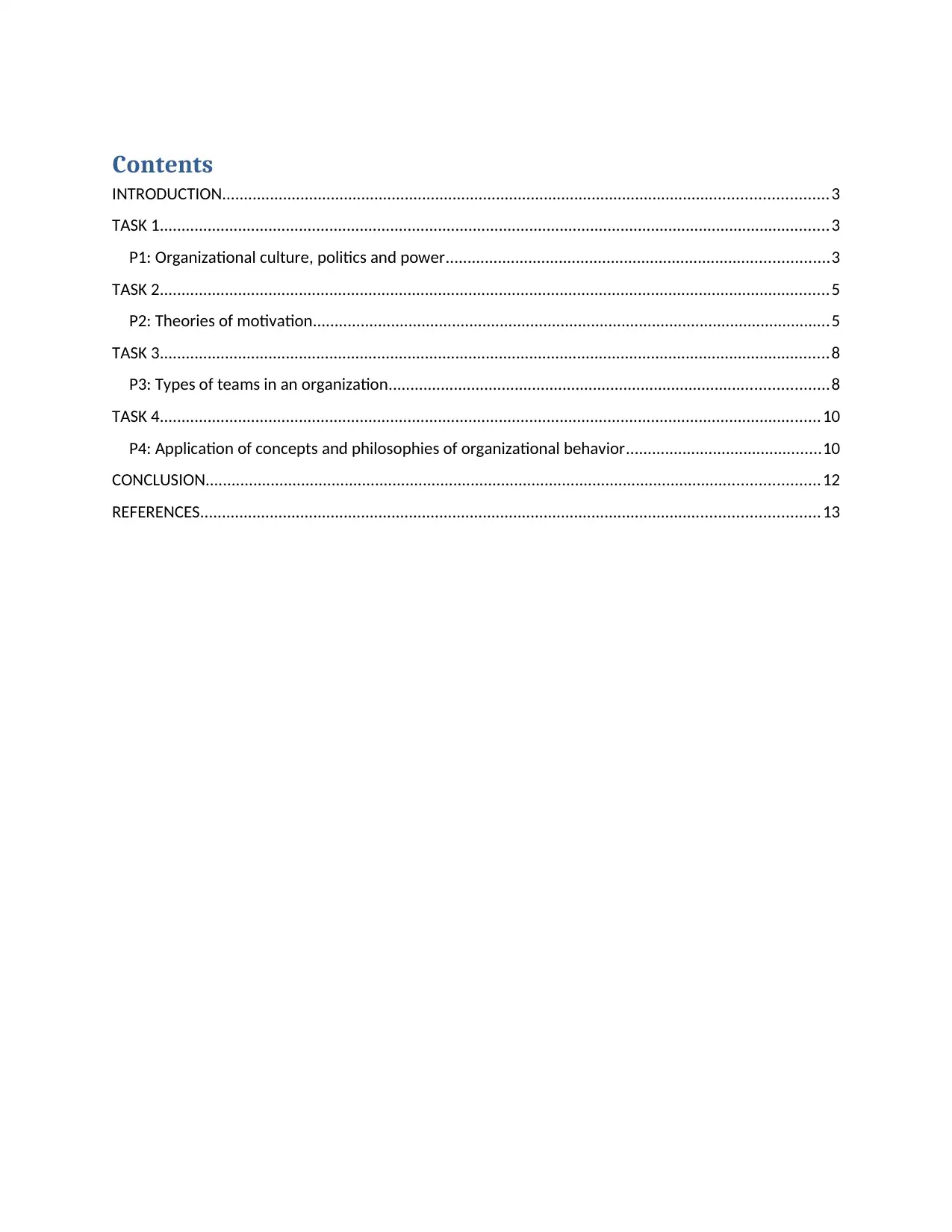
Contents
INTRODUCTION...........................................................................................................................................3
TASK 1..........................................................................................................................................................3
P1: Organizational culture, politics and power........................................................................................3
TASK 2..........................................................................................................................................................5
P2: Theories of motivation.......................................................................................................................5
TASK 3..........................................................................................................................................................8
P3: Types of teams in an organization.....................................................................................................8
TASK 4........................................................................................................................................................10
P4: Application of concepts and philosophies of organizational behavior.............................................10
CONCLUSION.............................................................................................................................................12
REFERENCES..............................................................................................................................................13
INTRODUCTION...........................................................................................................................................3
TASK 1..........................................................................................................................................................3
P1: Organizational culture, politics and power........................................................................................3
TASK 2..........................................................................................................................................................5
P2: Theories of motivation.......................................................................................................................5
TASK 3..........................................................................................................................................................8
P3: Types of teams in an organization.....................................................................................................8
TASK 4........................................................................................................................................................10
P4: Application of concepts and philosophies of organizational behavior.............................................10
CONCLUSION.............................................................................................................................................12
REFERENCES..............................................................................................................................................13
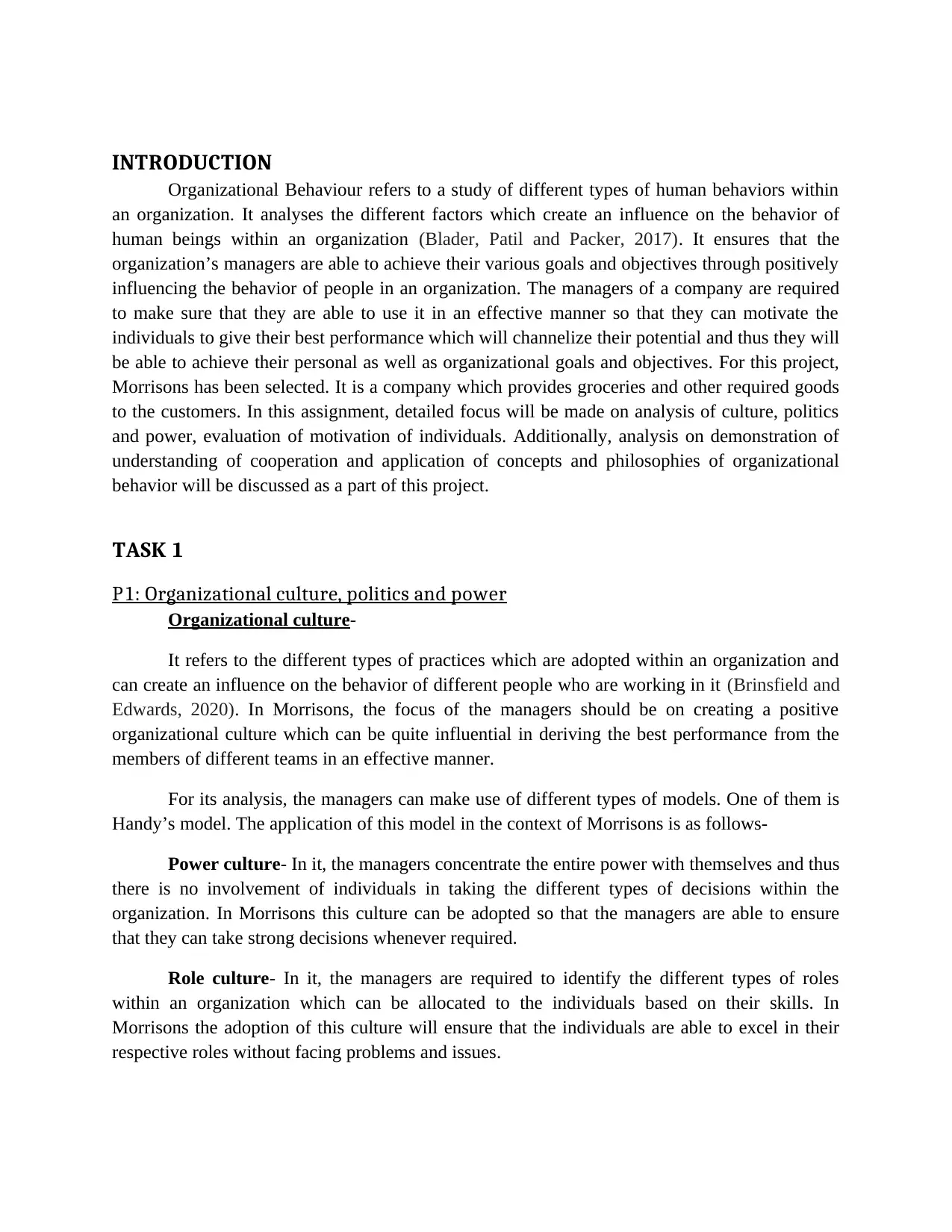
INTRODUCTION
Organizational Behaviour refers to a study of different types of human behaviors within
an organization. It analyses the different factors which create an influence on the behavior of
human beings within an organization (Blader, Patil and Packer, 2017). It ensures that the
organization’s managers are able to achieve their various goals and objectives through positively
influencing the behavior of people in an organization. The managers of a company are required
to make sure that they are able to use it in an effective manner so that they can motivate the
individuals to give their best performance which will channelize their potential and thus they will
be able to achieve their personal as well as organizational goals and objectives. For this project,
Morrisons has been selected. It is a company which provides groceries and other required goods
to the customers. In this assignment, detailed focus will be made on analysis of culture, politics
and power, evaluation of motivation of individuals. Additionally, analysis on demonstration of
understanding of cooperation and application of concepts and philosophies of organizational
behavior will be discussed as a part of this project.
TASK 1
P1: Organizational culture, politics and power
Organizational culture-
It refers to the different types of practices which are adopted within an organization and
can create an influence on the behavior of different people who are working in it (Brinsfield and
Edwards, 2020). In Morrisons, the focus of the managers should be on creating a positive
organizational culture which can be quite influential in deriving the best performance from the
members of different teams in an effective manner.
For its analysis, the managers can make use of different types of models. One of them is
Handy’s model. The application of this model in the context of Morrisons is as follows-
Power culture- In it, the managers concentrate the entire power with themselves and thus
there is no involvement of individuals in taking the different types of decisions within the
organization. In Morrisons this culture can be adopted so that the managers are able to ensure
that they can take strong decisions whenever required.
Role culture- In it, the managers are required to identify the different types of roles
within an organization which can be allocated to the individuals based on their skills. In
Morrisons the adoption of this culture will ensure that the individuals are able to excel in their
respective roles without facing problems and issues.
Organizational Behaviour refers to a study of different types of human behaviors within
an organization. It analyses the different factors which create an influence on the behavior of
human beings within an organization (Blader, Patil and Packer, 2017). It ensures that the
organization’s managers are able to achieve their various goals and objectives through positively
influencing the behavior of people in an organization. The managers of a company are required
to make sure that they are able to use it in an effective manner so that they can motivate the
individuals to give their best performance which will channelize their potential and thus they will
be able to achieve their personal as well as organizational goals and objectives. For this project,
Morrisons has been selected. It is a company which provides groceries and other required goods
to the customers. In this assignment, detailed focus will be made on analysis of culture, politics
and power, evaluation of motivation of individuals. Additionally, analysis on demonstration of
understanding of cooperation and application of concepts and philosophies of organizational
behavior will be discussed as a part of this project.
TASK 1
P1: Organizational culture, politics and power
Organizational culture-
It refers to the different types of practices which are adopted within an organization and
can create an influence on the behavior of different people who are working in it (Brinsfield and
Edwards, 2020). In Morrisons, the focus of the managers should be on creating a positive
organizational culture which can be quite influential in deriving the best performance from the
members of different teams in an effective manner.
For its analysis, the managers can make use of different types of models. One of them is
Handy’s model. The application of this model in the context of Morrisons is as follows-
Power culture- In it, the managers concentrate the entire power with themselves and thus
there is no involvement of individuals in taking the different types of decisions within the
organization. In Morrisons this culture can be adopted so that the managers are able to ensure
that they can take strong decisions whenever required.
Role culture- In it, the managers are required to identify the different types of roles
within an organization which can be allocated to the individuals based on their skills. In
Morrisons the adoption of this culture will ensure that the individuals are able to excel in their
respective roles without facing problems and issues.
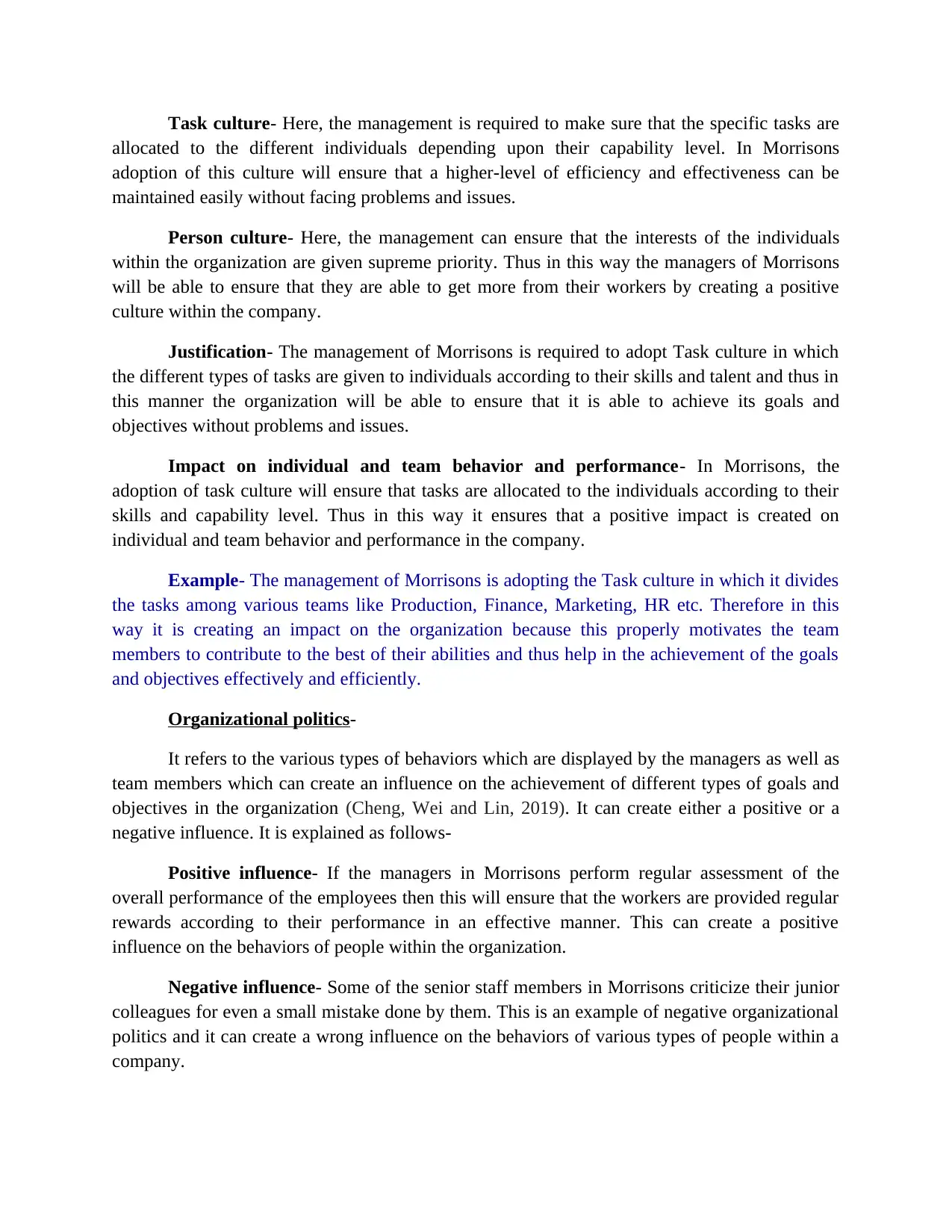
Task culture- Here, the management is required to make sure that the specific tasks are
allocated to the different individuals depending upon their capability level. In Morrisons
adoption of this culture will ensure that a higher-level of efficiency and effectiveness can be
maintained easily without facing problems and issues.
Person culture- Here, the management can ensure that the interests of the individuals
within the organization are given supreme priority. Thus in this way the managers of Morrisons
will be able to ensure that they are able to get more from their workers by creating a positive
culture within the company.
Justification- The management of Morrisons is required to adopt Task culture in which
the different types of tasks are given to individuals according to their skills and talent and thus in
this manner the organization will be able to ensure that it is able to achieve its goals and
objectives without problems and issues.
Impact on individual and team behavior and performance- In Morrisons, the
adoption of task culture will ensure that tasks are allocated to the individuals according to their
skills and capability level. Thus in this way it ensures that a positive impact is created on
individual and team behavior and performance in the company.
Example- The management of Morrisons is adopting the Task culture in which it divides
the tasks among various teams like Production, Finance, Marketing, HR etc. Therefore in this
way it is creating an impact on the organization because this properly motivates the team
members to contribute to the best of their abilities and thus help in the achievement of the goals
and objectives effectively and efficiently.
Organizational politics-
It refers to the various types of behaviors which are displayed by the managers as well as
team members which can create an influence on the achievement of different types of goals and
objectives in the organization (Cheng, Wei and Lin, 2019). It can create either a positive or a
negative influence. It is explained as follows-
Positive influence- If the managers in Morrisons perform regular assessment of the
overall performance of the employees then this will ensure that the workers are provided regular
rewards according to their performance in an effective manner. This can create a positive
influence on the behaviors of people within the organization.
Negative influence- Some of the senior staff members in Morrisons criticize their junior
colleagues for even a small mistake done by them. This is an example of negative organizational
politics and it can create a wrong influence on the behaviors of various types of people within a
company.
allocated to the different individuals depending upon their capability level. In Morrisons
adoption of this culture will ensure that a higher-level of efficiency and effectiveness can be
maintained easily without facing problems and issues.
Person culture- Here, the management can ensure that the interests of the individuals
within the organization are given supreme priority. Thus in this way the managers of Morrisons
will be able to ensure that they are able to get more from their workers by creating a positive
culture within the company.
Justification- The management of Morrisons is required to adopt Task culture in which
the different types of tasks are given to individuals according to their skills and talent and thus in
this manner the organization will be able to ensure that it is able to achieve its goals and
objectives without problems and issues.
Impact on individual and team behavior and performance- In Morrisons, the
adoption of task culture will ensure that tasks are allocated to the individuals according to their
skills and capability level. Thus in this way it ensures that a positive impact is created on
individual and team behavior and performance in the company.
Example- The management of Morrisons is adopting the Task culture in which it divides
the tasks among various teams like Production, Finance, Marketing, HR etc. Therefore in this
way it is creating an impact on the organization because this properly motivates the team
members to contribute to the best of their abilities and thus help in the achievement of the goals
and objectives effectively and efficiently.
Organizational politics-
It refers to the various types of behaviors which are displayed by the managers as well as
team members which can create an influence on the achievement of different types of goals and
objectives in the organization (Cheng, Wei and Lin, 2019). It can create either a positive or a
negative influence. It is explained as follows-
Positive influence- If the managers in Morrisons perform regular assessment of the
overall performance of the employees then this will ensure that the workers are provided regular
rewards according to their performance in an effective manner. This can create a positive
influence on the behaviors of people within the organization.
Negative influence- Some of the senior staff members in Morrisons criticize their junior
colleagues for even a small mistake done by them. This is an example of negative organizational
politics and it can create a wrong influence on the behaviors of various types of people within a
company.
Paraphrase This Document
Need a fresh take? Get an instant paraphrase of this document with our AI Paraphraser
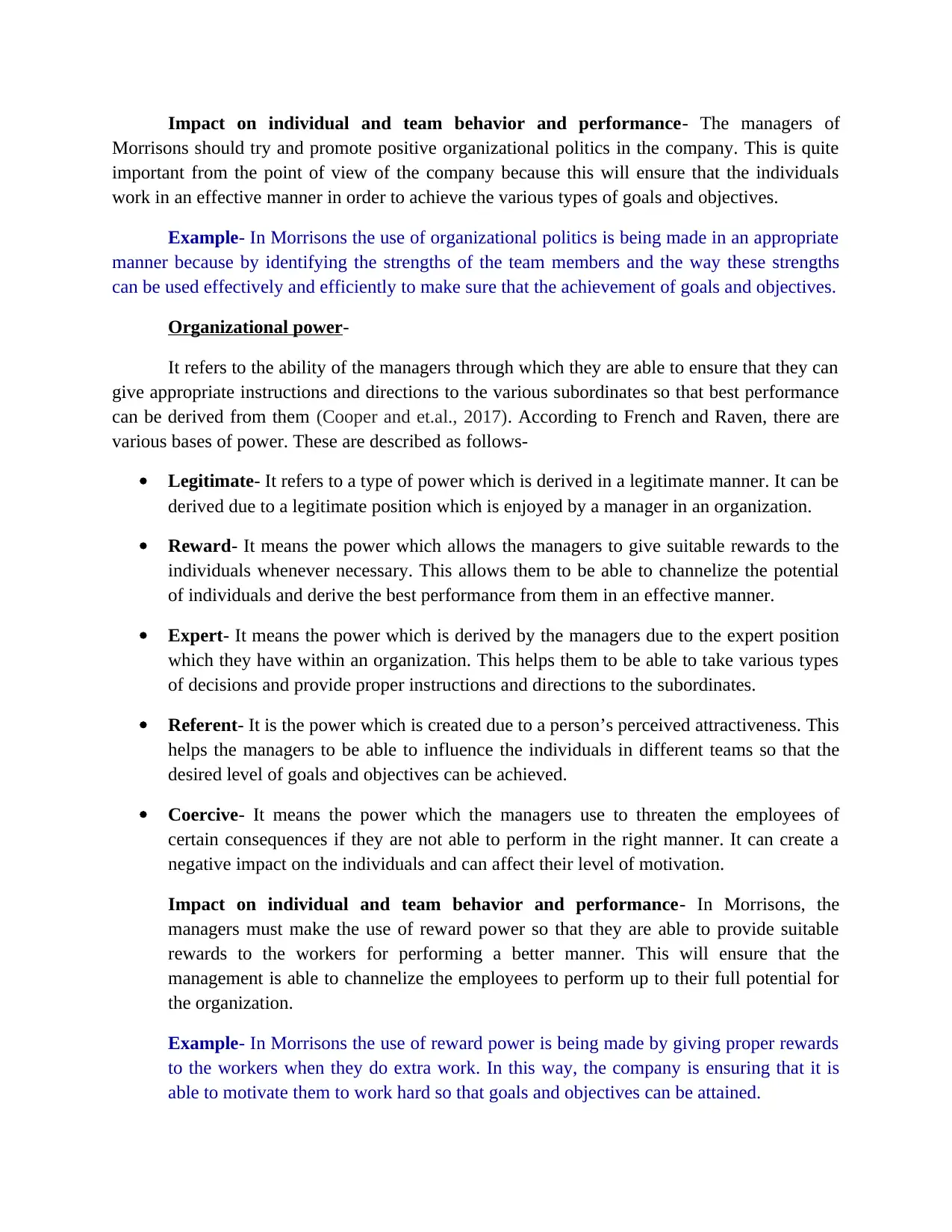
Impact on individual and team behavior and performance- The managers of
Morrisons should try and promote positive organizational politics in the company. This is quite
important from the point of view of the company because this will ensure that the individuals
work in an effective manner in order to achieve the various types of goals and objectives.
Example- In Morrisons the use of organizational politics is being made in an appropriate
manner because by identifying the strengths of the team members and the way these strengths
can be used effectively and efficiently to make sure that the achievement of goals and objectives.
Organizational power-
It refers to the ability of the managers through which they are able to ensure that they can
give appropriate instructions and directions to the various subordinates so that best performance
can be derived from them (Cooper and et.al., 2017). According to French and Raven, there are
various bases of power. These are described as follows-
Legitimate- It refers to a type of power which is derived in a legitimate manner. It can be
derived due to a legitimate position which is enjoyed by a manager in an organization.
Reward- It means the power which allows the managers to give suitable rewards to the
individuals whenever necessary. This allows them to be able to channelize the potential
of individuals and derive the best performance from them in an effective manner.
Expert- It means the power which is derived by the managers due to the expert position
which they have within an organization. This helps them to be able to take various types
of decisions and provide proper instructions and directions to the subordinates.
Referent- It is the power which is created due to a person’s perceived attractiveness. This
helps the managers to be able to influence the individuals in different teams so that the
desired level of goals and objectives can be achieved.
Coercive- It means the power which the managers use to threaten the employees of
certain consequences if they are not able to perform in the right manner. It can create a
negative impact on the individuals and can affect their level of motivation.
Impact on individual and team behavior and performance- In Morrisons, the
managers must make the use of reward power so that they are able to provide suitable
rewards to the workers for performing a better manner. This will ensure that the
management is able to channelize the employees to perform up to their full potential for
the organization.
Example- In Morrisons the use of reward power is being made by giving proper rewards
to the workers when they do extra work. In this way, the company is ensuring that it is
able to motivate them to work hard so that goals and objectives can be attained.
Morrisons should try and promote positive organizational politics in the company. This is quite
important from the point of view of the company because this will ensure that the individuals
work in an effective manner in order to achieve the various types of goals and objectives.
Example- In Morrisons the use of organizational politics is being made in an appropriate
manner because by identifying the strengths of the team members and the way these strengths
can be used effectively and efficiently to make sure that the achievement of goals and objectives.
Organizational power-
It refers to the ability of the managers through which they are able to ensure that they can
give appropriate instructions and directions to the various subordinates so that best performance
can be derived from them (Cooper and et.al., 2017). According to French and Raven, there are
various bases of power. These are described as follows-
Legitimate- It refers to a type of power which is derived in a legitimate manner. It can be
derived due to a legitimate position which is enjoyed by a manager in an organization.
Reward- It means the power which allows the managers to give suitable rewards to the
individuals whenever necessary. This allows them to be able to channelize the potential
of individuals and derive the best performance from them in an effective manner.
Expert- It means the power which is derived by the managers due to the expert position
which they have within an organization. This helps them to be able to take various types
of decisions and provide proper instructions and directions to the subordinates.
Referent- It is the power which is created due to a person’s perceived attractiveness. This
helps the managers to be able to influence the individuals in different teams so that the
desired level of goals and objectives can be achieved.
Coercive- It means the power which the managers use to threaten the employees of
certain consequences if they are not able to perform in the right manner. It can create a
negative impact on the individuals and can affect their level of motivation.
Impact on individual and team behavior and performance- In Morrisons, the
managers must make the use of reward power so that they are able to provide suitable
rewards to the workers for performing a better manner. This will ensure that the
management is able to channelize the employees to perform up to their full potential for
the organization.
Example- In Morrisons the use of reward power is being made by giving proper rewards
to the workers when they do extra work. In this way, the company is ensuring that it is
able to motivate them to work hard so that goals and objectives can be attained.
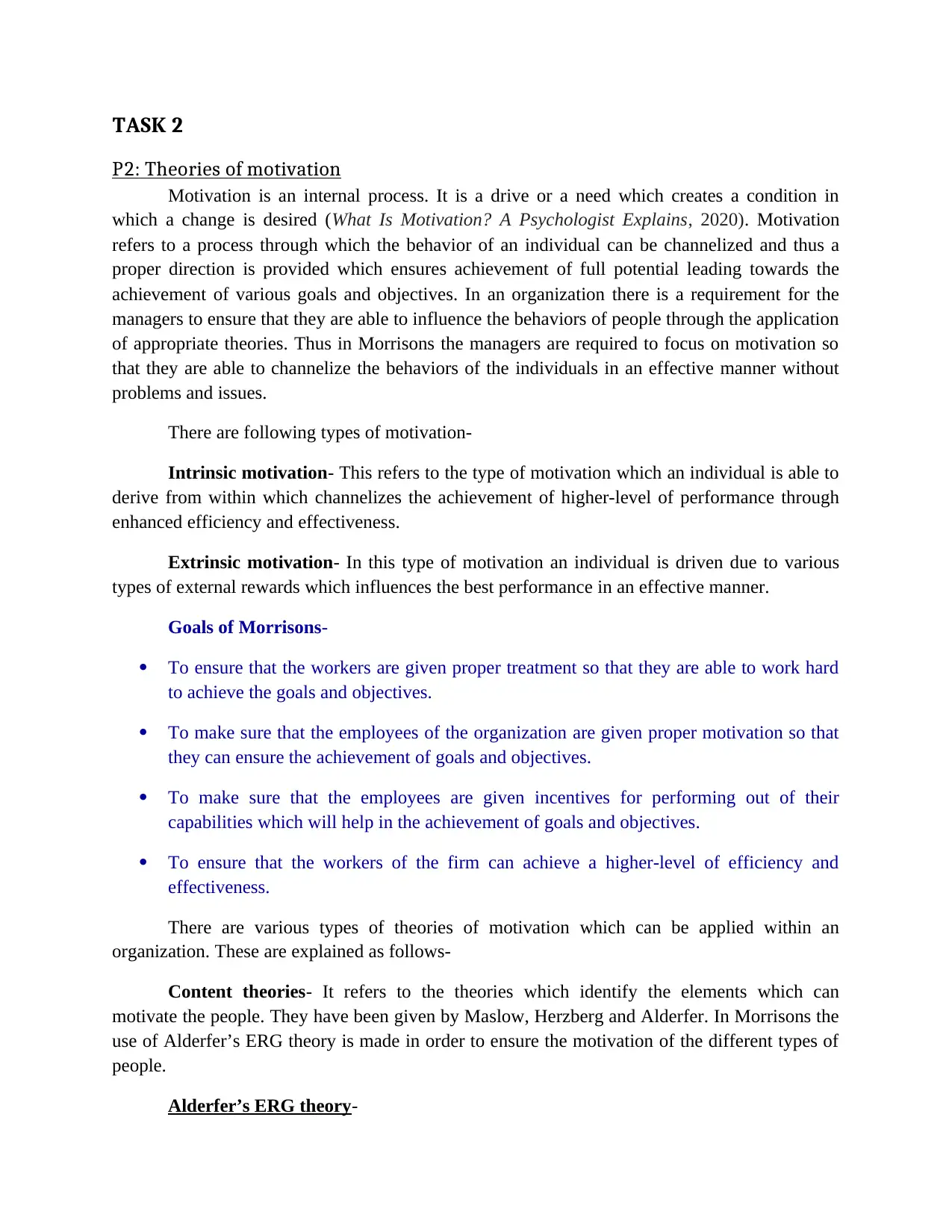
TASK 2
P2: Theories of motivation
Motivation is an internal process. It is a drive or a need which creates a condition in
which a change is desired (What Is Motivation? A Psychologist Explains, 2020). Motivation
refers to a process through which the behavior of an individual can be channelized and thus a
proper direction is provided which ensures achievement of full potential leading towards the
achievement of various goals and objectives. In an organization there is a requirement for the
managers to ensure that they are able to influence the behaviors of people through the application
of appropriate theories. Thus in Morrisons the managers are required to focus on motivation so
that they are able to channelize the behaviors of the individuals in an effective manner without
problems and issues.
There are following types of motivation-
Intrinsic motivation- This refers to the type of motivation which an individual is able to
derive from within which channelizes the achievement of higher-level of performance through
enhanced efficiency and effectiveness.
Extrinsic motivation- In this type of motivation an individual is driven due to various
types of external rewards which influences the best performance in an effective manner.
Goals of Morrisons-
To ensure that the workers are given proper treatment so that they are able to work hard
to achieve the goals and objectives.
To make sure that the employees of the organization are given proper motivation so that
they can ensure the achievement of goals and objectives.
To make sure that the employees are given incentives for performing out of their
capabilities which will help in the achievement of goals and objectives.
To ensure that the workers of the firm can achieve a higher-level of efficiency and
effectiveness.
There are various types of theories of motivation which can be applied within an
organization. These are explained as follows-
Content theories- It refers to the theories which identify the elements which can
motivate the people. They have been given by Maslow, Herzberg and Alderfer. In Morrisons the
use of Alderfer’s ERG theory is made in order to ensure the motivation of the different types of
people.
Alderfer’s ERG theory-
P2: Theories of motivation
Motivation is an internal process. It is a drive or a need which creates a condition in
which a change is desired (What Is Motivation? A Psychologist Explains, 2020). Motivation
refers to a process through which the behavior of an individual can be channelized and thus a
proper direction is provided which ensures achievement of full potential leading towards the
achievement of various goals and objectives. In an organization there is a requirement for the
managers to ensure that they are able to influence the behaviors of people through the application
of appropriate theories. Thus in Morrisons the managers are required to focus on motivation so
that they are able to channelize the behaviors of the individuals in an effective manner without
problems and issues.
There are following types of motivation-
Intrinsic motivation- This refers to the type of motivation which an individual is able to
derive from within which channelizes the achievement of higher-level of performance through
enhanced efficiency and effectiveness.
Extrinsic motivation- In this type of motivation an individual is driven due to various
types of external rewards which influences the best performance in an effective manner.
Goals of Morrisons-
To ensure that the workers are given proper treatment so that they are able to work hard
to achieve the goals and objectives.
To make sure that the employees of the organization are given proper motivation so that
they can ensure the achievement of goals and objectives.
To make sure that the employees are given incentives for performing out of their
capabilities which will help in the achievement of goals and objectives.
To ensure that the workers of the firm can achieve a higher-level of efficiency and
effectiveness.
There are various types of theories of motivation which can be applied within an
organization. These are explained as follows-
Content theories- It refers to the theories which identify the elements which can
motivate the people. They have been given by Maslow, Herzberg and Alderfer. In Morrisons the
use of Alderfer’s ERG theory is made in order to ensure the motivation of the different types of
people.
Alderfer’s ERG theory-
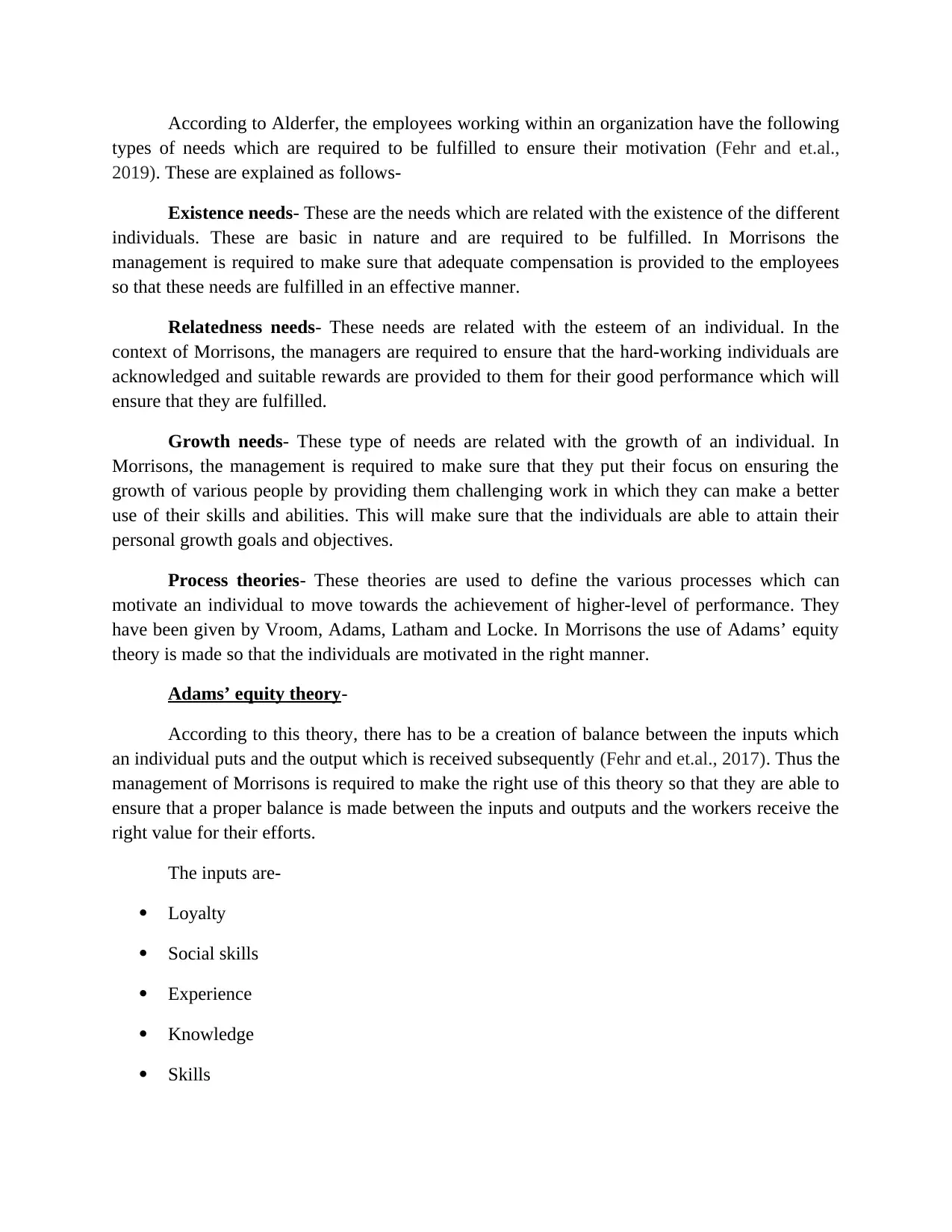
According to Alderfer, the employees working within an organization have the following
types of needs which are required to be fulfilled to ensure their motivation (Fehr and et.al.,
2019). These are explained as follows-
Existence needs- These are the needs which are related with the existence of the different
individuals. These are basic in nature and are required to be fulfilled. In Morrisons the
management is required to make sure that adequate compensation is provided to the employees
so that these needs are fulfilled in an effective manner.
Relatedness needs- These needs are related with the esteem of an individual. In the
context of Morrisons, the managers are required to ensure that the hard-working individuals are
acknowledged and suitable rewards are provided to them for their good performance which will
ensure that they are fulfilled.
Growth needs- These type of needs are related with the growth of an individual. In
Morrisons, the management is required to make sure that they put their focus on ensuring the
growth of various people by providing them challenging work in which they can make a better
use of their skills and abilities. This will make sure that the individuals are able to attain their
personal growth goals and objectives.
Process theories- These theories are used to define the various processes which can
motivate an individual to move towards the achievement of higher-level of performance. They
have been given by Vroom, Adams, Latham and Locke. In Morrisons the use of Adams’ equity
theory is made so that the individuals are motivated in the right manner.
Adams’ equity theory-
According to this theory, there has to be a creation of balance between the inputs which
an individual puts and the output which is received subsequently (Fehr and et.al., 2017). Thus the
management of Morrisons is required to make the right use of this theory so that they are able to
ensure that a proper balance is made between the inputs and outputs and the workers receive the
right value for their efforts.
The inputs are-
Loyalty
Social skills
Experience
Knowledge
Skills
types of needs which are required to be fulfilled to ensure their motivation (Fehr and et.al.,
2019). These are explained as follows-
Existence needs- These are the needs which are related with the existence of the different
individuals. These are basic in nature and are required to be fulfilled. In Morrisons the
management is required to make sure that adequate compensation is provided to the employees
so that these needs are fulfilled in an effective manner.
Relatedness needs- These needs are related with the esteem of an individual. In the
context of Morrisons, the managers are required to ensure that the hard-working individuals are
acknowledged and suitable rewards are provided to them for their good performance which will
ensure that they are fulfilled.
Growth needs- These type of needs are related with the growth of an individual. In
Morrisons, the management is required to make sure that they put their focus on ensuring the
growth of various people by providing them challenging work in which they can make a better
use of their skills and abilities. This will make sure that the individuals are able to attain their
personal growth goals and objectives.
Process theories- These theories are used to define the various processes which can
motivate an individual to move towards the achievement of higher-level of performance. They
have been given by Vroom, Adams, Latham and Locke. In Morrisons the use of Adams’ equity
theory is made so that the individuals are motivated in the right manner.
Adams’ equity theory-
According to this theory, there has to be a creation of balance between the inputs which
an individual puts and the output which is received subsequently (Fehr and et.al., 2017). Thus the
management of Morrisons is required to make the right use of this theory so that they are able to
ensure that a proper balance is made between the inputs and outputs and the workers receive the
right value for their efforts.
The inputs are-
Loyalty
Social skills
Experience
Knowledge
Skills
Secure Best Marks with AI Grader
Need help grading? Try our AI Grader for instant feedback on your assignments.
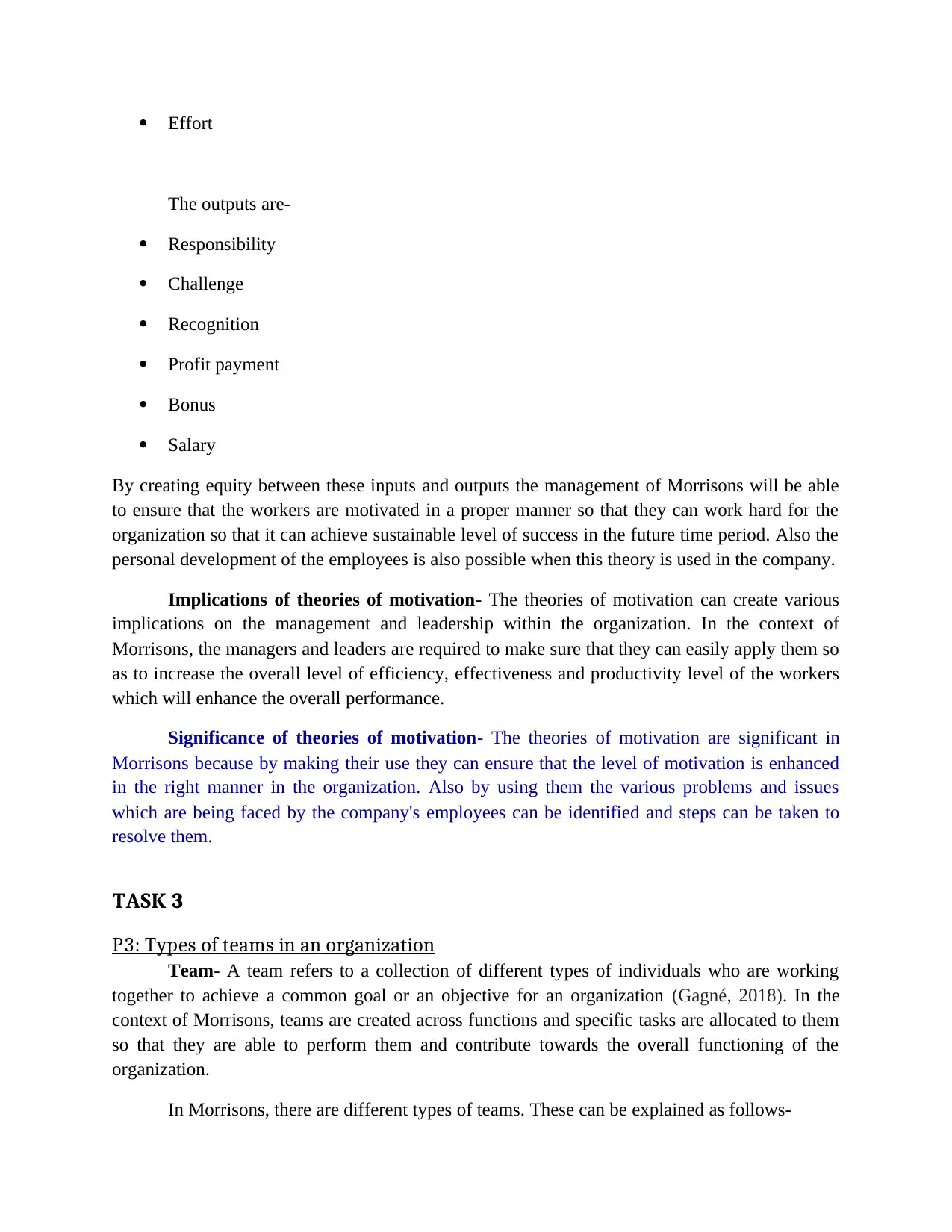
Effort
The outputs are-
Responsibility
Challenge
Recognition
Profit payment
Bonus
Salary
By creating equity between these inputs and outputs the management of Morrisons will be able
to ensure that the workers are motivated in a proper manner so that they can work hard for the
organization so that it can achieve sustainable level of success in the future time period. Also the
personal development of the employees is also possible when this theory is used in the company.
Implications of theories of motivation- The theories of motivation can create various
implications on the management and leadership within the organization. In the context of
Morrisons, the managers and leaders are required to make sure that they can easily apply them so
as to increase the overall level of efficiency, effectiveness and productivity level of the workers
which will enhance the overall performance.
Significance of theories of motivation- The theories of motivation are significant in
Morrisons because by making their use they can ensure that the level of motivation is enhanced
in the right manner in the organization. Also by using them the various problems and issues
which are being faced by the company's employees can be identified and steps can be taken to
resolve them.
TASK 3
P3: Types of teams in an organization
Team- A team refers to a collection of different types of individuals who are working
together to achieve a common goal or an objective for an organization (Gagné, 2018). In the
context of Morrisons, teams are created across functions and specific tasks are allocated to them
so that they are able to perform them and contribute towards the overall functioning of the
organization.
In Morrisons, there are different types of teams. These can be explained as follows-
The outputs are-
Responsibility
Challenge
Recognition
Profit payment
Bonus
Salary
By creating equity between these inputs and outputs the management of Morrisons will be able
to ensure that the workers are motivated in a proper manner so that they can work hard for the
organization so that it can achieve sustainable level of success in the future time period. Also the
personal development of the employees is also possible when this theory is used in the company.
Implications of theories of motivation- The theories of motivation can create various
implications on the management and leadership within the organization. In the context of
Morrisons, the managers and leaders are required to make sure that they can easily apply them so
as to increase the overall level of efficiency, effectiveness and productivity level of the workers
which will enhance the overall performance.
Significance of theories of motivation- The theories of motivation are significant in
Morrisons because by making their use they can ensure that the level of motivation is enhanced
in the right manner in the organization. Also by using them the various problems and issues
which are being faced by the company's employees can be identified and steps can be taken to
resolve them.
TASK 3
P3: Types of teams in an organization
Team- A team refers to a collection of different types of individuals who are working
together to achieve a common goal or an objective for an organization (Gagné, 2018). In the
context of Morrisons, teams are created across functions and specific tasks are allocated to them
so that they are able to perform them and contribute towards the overall functioning of the
organization.
In Morrisons, there are different types of teams. These can be explained as follows-
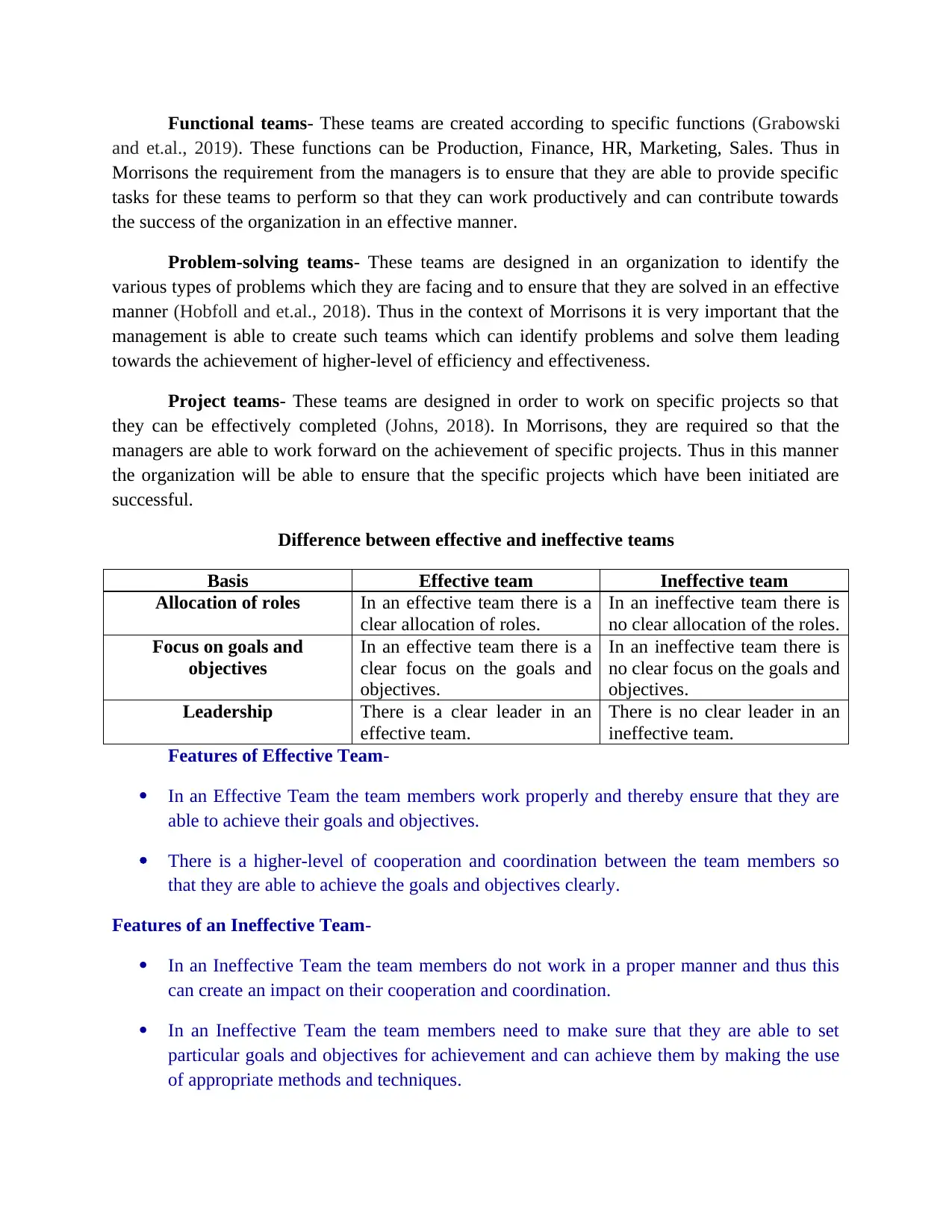
Functional teams- These teams are created according to specific functions (Grabowski
and et.al., 2019). These functions can be Production, Finance, HR, Marketing, Sales. Thus in
Morrisons the requirement from the managers is to ensure that they are able to provide specific
tasks for these teams to perform so that they can work productively and can contribute towards
the success of the organization in an effective manner.
Problem-solving teams- These teams are designed in an organization to identify the
various types of problems which they are facing and to ensure that they are solved in an effective
manner (Hobfoll and et.al., 2018). Thus in the context of Morrisons it is very important that the
management is able to create such teams which can identify problems and solve them leading
towards the achievement of higher-level of efficiency and effectiveness.
Project teams- These teams are designed in order to work on specific projects so that
they can be effectively completed (Johns, 2018). In Morrisons, they are required so that the
managers are able to work forward on the achievement of specific projects. Thus in this manner
the organization will be able to ensure that the specific projects which have been initiated are
successful.
Difference between effective and ineffective teams
Basis Effective team Ineffective team
Allocation of roles In an effective team there is a
clear allocation of roles.
In an ineffective team there is
no clear allocation of the roles.
Focus on goals and
objectives
In an effective team there is a
clear focus on the goals and
objectives.
In an ineffective team there is
no clear focus on the goals and
objectives.
Leadership There is a clear leader in an
effective team.
There is no clear leader in an
ineffective team.
Features of Effective Team-
In an Effective Team the team members work properly and thereby ensure that they are
able to achieve their goals and objectives.
There is a higher-level of cooperation and coordination between the team members so
that they are able to achieve the goals and objectives clearly.
Features of an Ineffective Team-
In an Ineffective Team the team members do not work in a proper manner and thus this
can create an impact on their cooperation and coordination.
In an Ineffective Team the team members need to make sure that they are able to set
particular goals and objectives for achievement and can achieve them by making the use
of appropriate methods and techniques.
and et.al., 2019). These functions can be Production, Finance, HR, Marketing, Sales. Thus in
Morrisons the requirement from the managers is to ensure that they are able to provide specific
tasks for these teams to perform so that they can work productively and can contribute towards
the success of the organization in an effective manner.
Problem-solving teams- These teams are designed in an organization to identify the
various types of problems which they are facing and to ensure that they are solved in an effective
manner (Hobfoll and et.al., 2018). Thus in the context of Morrisons it is very important that the
management is able to create such teams which can identify problems and solve them leading
towards the achievement of higher-level of efficiency and effectiveness.
Project teams- These teams are designed in order to work on specific projects so that
they can be effectively completed (Johns, 2018). In Morrisons, they are required so that the
managers are able to work forward on the achievement of specific projects. Thus in this manner
the organization will be able to ensure that the specific projects which have been initiated are
successful.
Difference between effective and ineffective teams
Basis Effective team Ineffective team
Allocation of roles In an effective team there is a
clear allocation of roles.
In an ineffective team there is
no clear allocation of the roles.
Focus on goals and
objectives
In an effective team there is a
clear focus on the goals and
objectives.
In an ineffective team there is
no clear focus on the goals and
objectives.
Leadership There is a clear leader in an
effective team.
There is no clear leader in an
ineffective team.
Features of Effective Team-
In an Effective Team the team members work properly and thereby ensure that they are
able to achieve their goals and objectives.
There is a higher-level of cooperation and coordination between the team members so
that they are able to achieve the goals and objectives clearly.
Features of an Ineffective Team-
In an Ineffective Team the team members do not work in a proper manner and thus this
can create an impact on their cooperation and coordination.
In an Ineffective Team the team members need to make sure that they are able to set
particular goals and objectives for achievement and can achieve them by making the use
of appropriate methods and techniques.
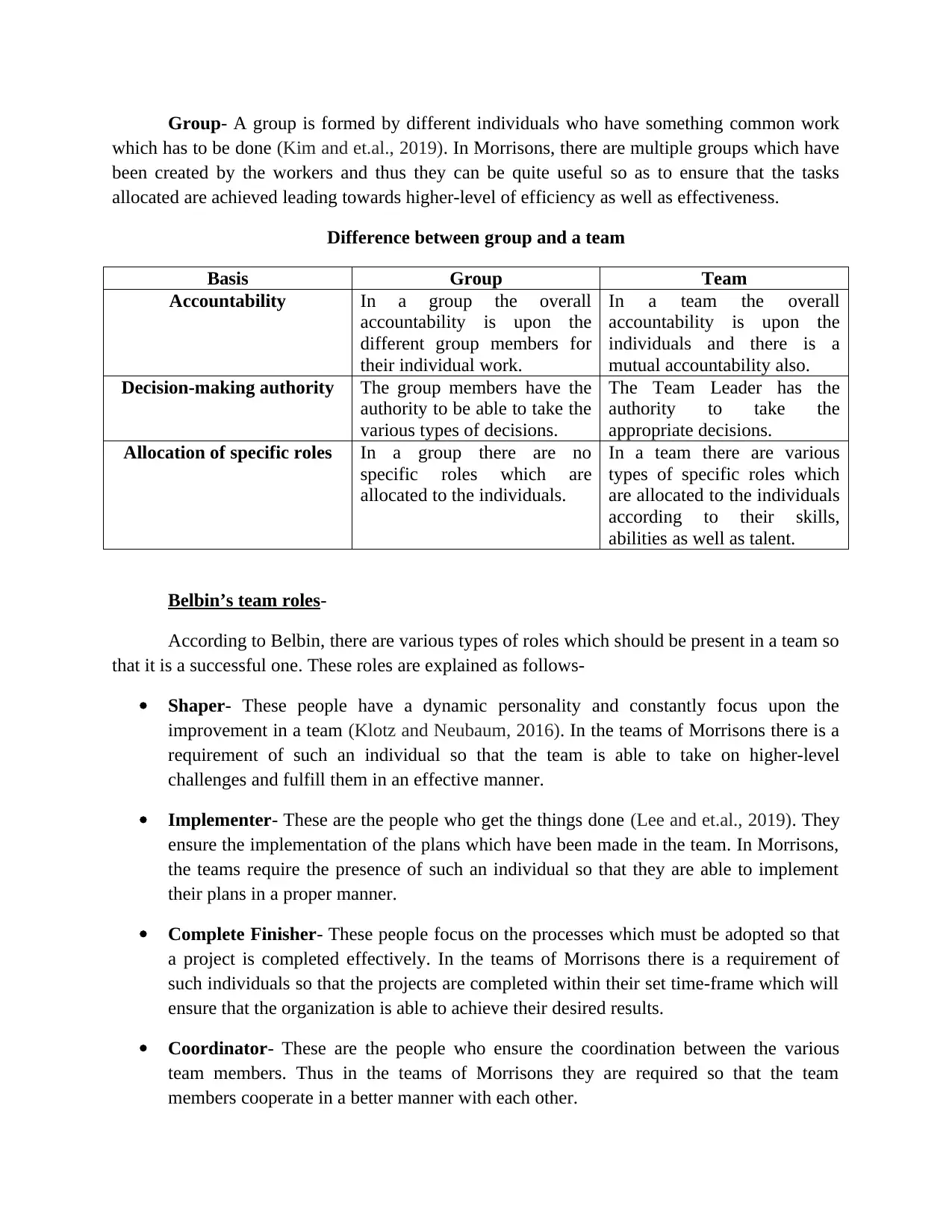
Group- A group is formed by different individuals who have something common work
which has to be done (Kim and et.al., 2019). In Morrisons, there are multiple groups which have
been created by the workers and thus they can be quite useful so as to ensure that the tasks
allocated are achieved leading towards higher-level of efficiency as well as effectiveness.
Difference between group and a team
Basis Group Team
Accountability In a group the overall
accountability is upon the
different group members for
their individual work.
In a team the overall
accountability is upon the
individuals and there is a
mutual accountability also.
Decision-making authority The group members have the
authority to be able to take the
various types of decisions.
The Team Leader has the
authority to take the
appropriate decisions.
Allocation of specific roles In a group there are no
specific roles which are
allocated to the individuals.
In a team there are various
types of specific roles which
are allocated to the individuals
according to their skills,
abilities as well as talent.
Belbin’s team roles-
According to Belbin, there are various types of roles which should be present in a team so
that it is a successful one. These roles are explained as follows-
Shaper- These people have a dynamic personality and constantly focus upon the
improvement in a team (Klotz and Neubaum, 2016). In the teams of Morrisons there is a
requirement of such an individual so that the team is able to take on higher-level
challenges and fulfill them in an effective manner.
Implementer- These are the people who get the things done (Lee and et.al., 2019). They
ensure the implementation of the plans which have been made in the team. In Morrisons,
the teams require the presence of such an individual so that they are able to implement
their plans in a proper manner.
Complete Finisher- These people focus on the processes which must be adopted so that
a project is completed effectively. In the teams of Morrisons there is a requirement of
such individuals so that the projects are completed within their set time-frame which will
ensure that the organization is able to achieve their desired results.
Coordinator- These are the people who ensure the coordination between the various
team members. Thus in the teams of Morrisons they are required so that the team
members cooperate in a better manner with each other.
which has to be done (Kim and et.al., 2019). In Morrisons, there are multiple groups which have
been created by the workers and thus they can be quite useful so as to ensure that the tasks
allocated are achieved leading towards higher-level of efficiency as well as effectiveness.
Difference between group and a team
Basis Group Team
Accountability In a group the overall
accountability is upon the
different group members for
their individual work.
In a team the overall
accountability is upon the
individuals and there is a
mutual accountability also.
Decision-making authority The group members have the
authority to be able to take the
various types of decisions.
The Team Leader has the
authority to take the
appropriate decisions.
Allocation of specific roles In a group there are no
specific roles which are
allocated to the individuals.
In a team there are various
types of specific roles which
are allocated to the individuals
according to their skills,
abilities as well as talent.
Belbin’s team roles-
According to Belbin, there are various types of roles which should be present in a team so
that it is a successful one. These roles are explained as follows-
Shaper- These people have a dynamic personality and constantly focus upon the
improvement in a team (Klotz and Neubaum, 2016). In the teams of Morrisons there is a
requirement of such an individual so that the team is able to take on higher-level
challenges and fulfill them in an effective manner.
Implementer- These are the people who get the things done (Lee and et.al., 2019). They
ensure the implementation of the plans which have been made in the team. In Morrisons,
the teams require the presence of such an individual so that they are able to implement
their plans in a proper manner.
Complete Finisher- These people focus on the processes which must be adopted so that
a project is completed effectively. In the teams of Morrisons there is a requirement of
such individuals so that the projects are completed within their set time-frame which will
ensure that the organization is able to achieve their desired results.
Coordinator- These are the people who ensure the coordination between the various
team members. Thus in the teams of Morrisons they are required so that the team
members cooperate in a better manner with each other.
Paraphrase This Document
Need a fresh take? Get an instant paraphrase of this document with our AI Paraphraser
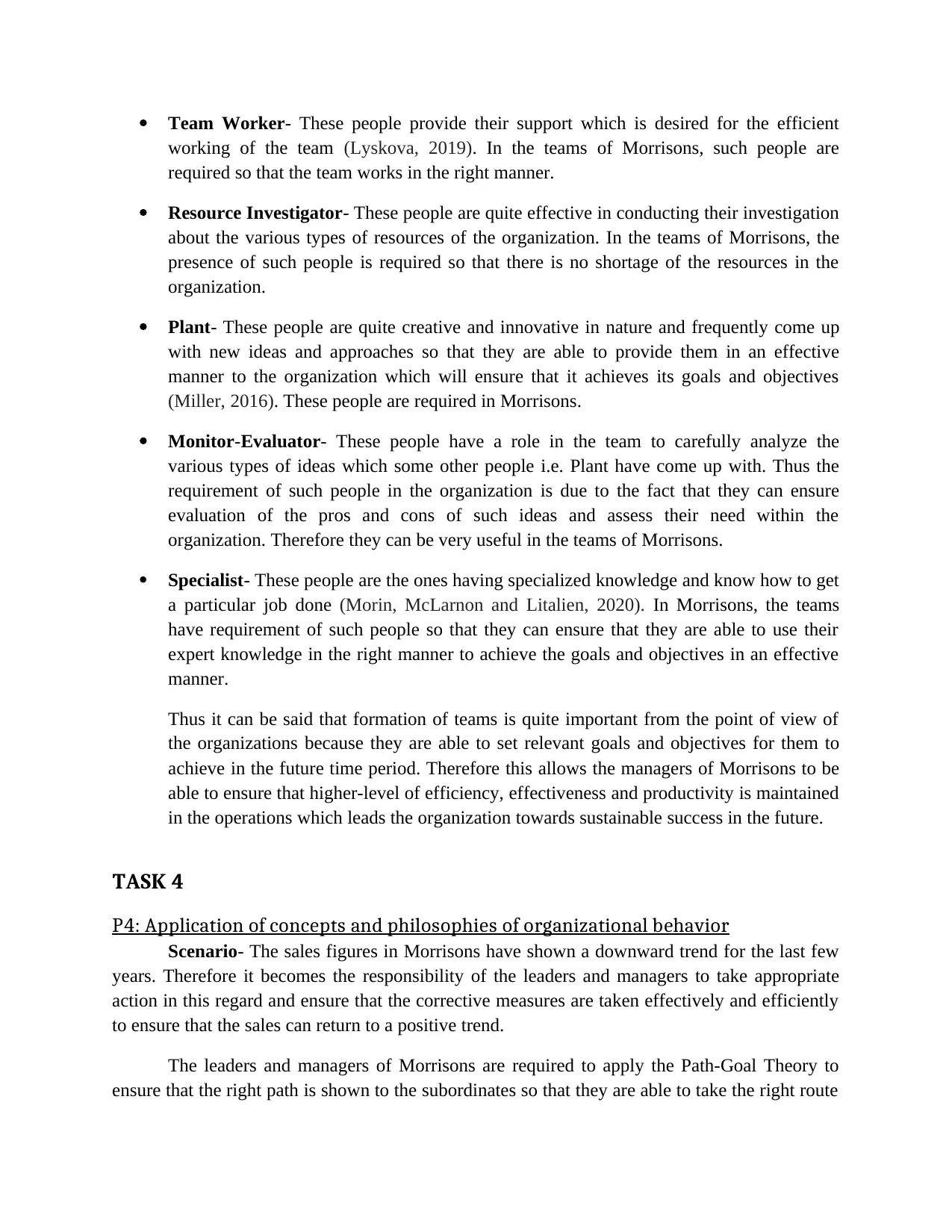
Team Worker- These people provide their support which is desired for the efficient
working of the team (Lyskova, 2019). In the teams of Morrisons, such people are
required so that the team works in the right manner.
Resource Investigator- These people are quite effective in conducting their investigation
about the various types of resources of the organization. In the teams of Morrisons, the
presence of such people is required so that there is no shortage of the resources in the
organization.
Plant- These people are quite creative and innovative in nature and frequently come up
with new ideas and approaches so that they are able to provide them in an effective
manner to the organization which will ensure that it achieves its goals and objectives
(Miller, 2016). These people are required in Morrisons.
Monitor-Evaluator- These people have a role in the team to carefully analyze the
various types of ideas which some other people i.e. Plant have come up with. Thus the
requirement of such people in the organization is due to the fact that they can ensure
evaluation of the pros and cons of such ideas and assess their need within the
organization. Therefore they can be very useful in the teams of Morrisons.
Specialist- These people are the ones having specialized knowledge and know how to get
a particular job done (Morin, McLarnon and Litalien, 2020). In Morrisons, the teams
have requirement of such people so that they can ensure that they are able to use their
expert knowledge in the right manner to achieve the goals and objectives in an effective
manner.
Thus it can be said that formation of teams is quite important from the point of view of
the organizations because they are able to set relevant goals and objectives for them to
achieve in the future time period. Therefore this allows the managers of Morrisons to be
able to ensure that higher-level of efficiency, effectiveness and productivity is maintained
in the operations which leads the organization towards sustainable success in the future.
TASK 4
P4: Application of concepts and philosophies of organizational behavior
Scenario- The sales figures in Morrisons have shown a downward trend for the last few
years. Therefore it becomes the responsibility of the leaders and managers to take appropriate
action in this regard and ensure that the corrective measures are taken effectively and efficiently
to ensure that the sales can return to a positive trend.
The leaders and managers of Morrisons are required to apply the Path-Goal Theory to
ensure that the right path is shown to the subordinates so that they are able to take the right route
working of the team (Lyskova, 2019). In the teams of Morrisons, such people are
required so that the team works in the right manner.
Resource Investigator- These people are quite effective in conducting their investigation
about the various types of resources of the organization. In the teams of Morrisons, the
presence of such people is required so that there is no shortage of the resources in the
organization.
Plant- These people are quite creative and innovative in nature and frequently come up
with new ideas and approaches so that they are able to provide them in an effective
manner to the organization which will ensure that it achieves its goals and objectives
(Miller, 2016). These people are required in Morrisons.
Monitor-Evaluator- These people have a role in the team to carefully analyze the
various types of ideas which some other people i.e. Plant have come up with. Thus the
requirement of such people in the organization is due to the fact that they can ensure
evaluation of the pros and cons of such ideas and assess their need within the
organization. Therefore they can be very useful in the teams of Morrisons.
Specialist- These people are the ones having specialized knowledge and know how to get
a particular job done (Morin, McLarnon and Litalien, 2020). In Morrisons, the teams
have requirement of such people so that they can ensure that they are able to use their
expert knowledge in the right manner to achieve the goals and objectives in an effective
manner.
Thus it can be said that formation of teams is quite important from the point of view of
the organizations because they are able to set relevant goals and objectives for them to
achieve in the future time period. Therefore this allows the managers of Morrisons to be
able to ensure that higher-level of efficiency, effectiveness and productivity is maintained
in the operations which leads the organization towards sustainable success in the future.
TASK 4
P4: Application of concepts and philosophies of organizational behavior
Scenario- The sales figures in Morrisons have shown a downward trend for the last few
years. Therefore it becomes the responsibility of the leaders and managers to take appropriate
action in this regard and ensure that the corrective measures are taken effectively and efficiently
to ensure that the sales can return to a positive trend.
The leaders and managers of Morrisons are required to apply the Path-Goal Theory to
ensure that the right path is shown to the subordinates so that they are able to take the right route
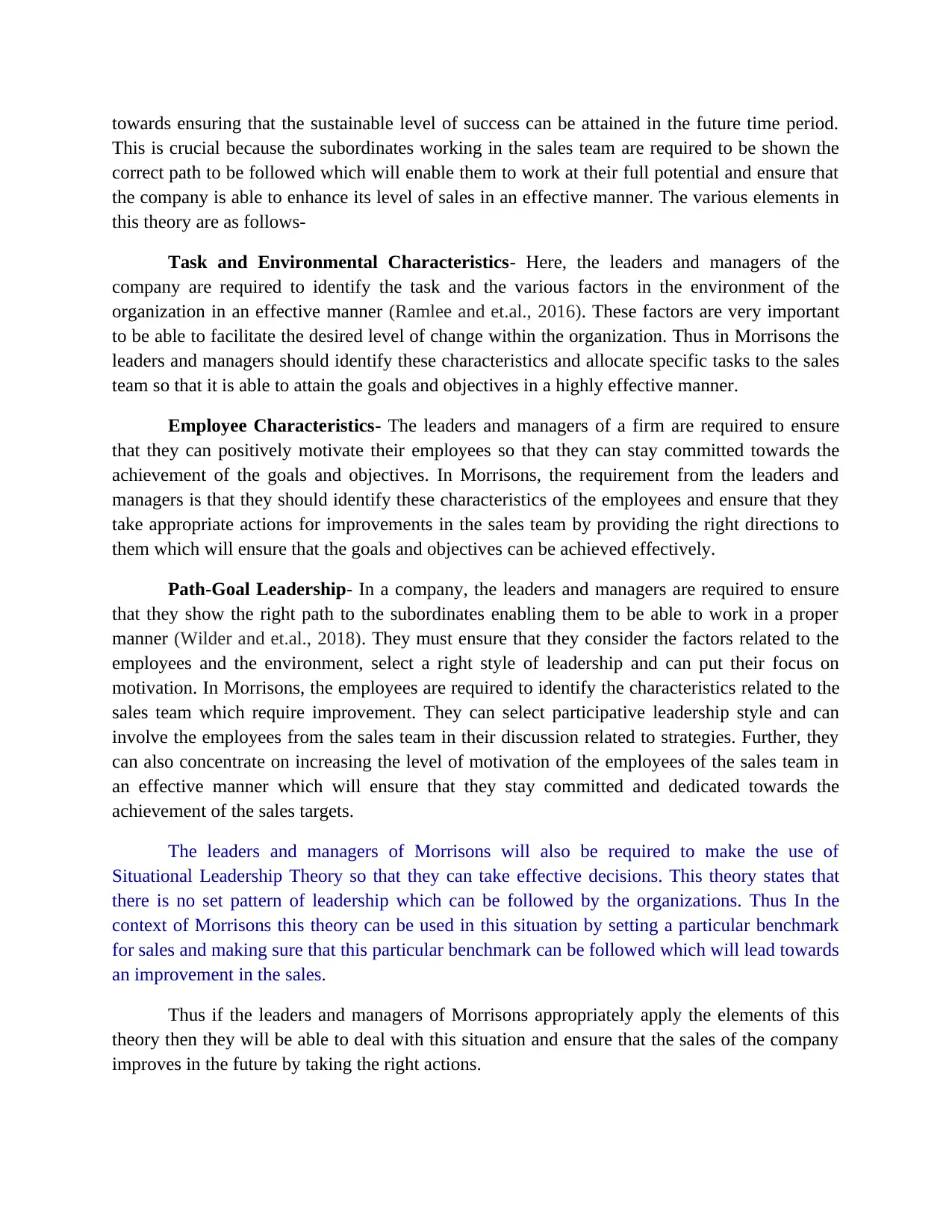
towards ensuring that the sustainable level of success can be attained in the future time period.
This is crucial because the subordinates working in the sales team are required to be shown the
correct path to be followed which will enable them to work at their full potential and ensure that
the company is able to enhance its level of sales in an effective manner. The various elements in
this theory are as follows-
Task and Environmental Characteristics- Here, the leaders and managers of the
company are required to identify the task and the various factors in the environment of the
organization in an effective manner (Ramlee and et.al., 2016). These factors are very important
to be able to facilitate the desired level of change within the organization. Thus in Morrisons the
leaders and managers should identify these characteristics and allocate specific tasks to the sales
team so that it is able to attain the goals and objectives in a highly effective manner.
Employee Characteristics- The leaders and managers of a firm are required to ensure
that they can positively motivate their employees so that they can stay committed towards the
achievement of the goals and objectives. In Morrisons, the requirement from the leaders and
managers is that they should identify these characteristics of the employees and ensure that they
take appropriate actions for improvements in the sales team by providing the right directions to
them which will ensure that the goals and objectives can be achieved effectively.
Path-Goal Leadership- In a company, the leaders and managers are required to ensure
that they show the right path to the subordinates enabling them to be able to work in a proper
manner (Wilder and et.al., 2018). They must ensure that they consider the factors related to the
employees and the environment, select a right style of leadership and can put their focus on
motivation. In Morrisons, the employees are required to identify the characteristics related to the
sales team which require improvement. They can select participative leadership style and can
involve the employees from the sales team in their discussion related to strategies. Further, they
can also concentrate on increasing the level of motivation of the employees of the sales team in
an effective manner which will ensure that they stay committed and dedicated towards the
achievement of the sales targets.
The leaders and managers of Morrisons will also be required to make the use of
Situational Leadership Theory so that they can take effective decisions. This theory states that
there is no set pattern of leadership which can be followed by the organizations. Thus In the
context of Morrisons this theory can be used in this situation by setting a particular benchmark
for sales and making sure that this particular benchmark can be followed which will lead towards
an improvement in the sales.
Thus if the leaders and managers of Morrisons appropriately apply the elements of this
theory then they will be able to deal with this situation and ensure that the sales of the company
improves in the future by taking the right actions.
This is crucial because the subordinates working in the sales team are required to be shown the
correct path to be followed which will enable them to work at their full potential and ensure that
the company is able to enhance its level of sales in an effective manner. The various elements in
this theory are as follows-
Task and Environmental Characteristics- Here, the leaders and managers of the
company are required to identify the task and the various factors in the environment of the
organization in an effective manner (Ramlee and et.al., 2016). These factors are very important
to be able to facilitate the desired level of change within the organization. Thus in Morrisons the
leaders and managers should identify these characteristics and allocate specific tasks to the sales
team so that it is able to attain the goals and objectives in a highly effective manner.
Employee Characteristics- The leaders and managers of a firm are required to ensure
that they can positively motivate their employees so that they can stay committed towards the
achievement of the goals and objectives. In Morrisons, the requirement from the leaders and
managers is that they should identify these characteristics of the employees and ensure that they
take appropriate actions for improvements in the sales team by providing the right directions to
them which will ensure that the goals and objectives can be achieved effectively.
Path-Goal Leadership- In a company, the leaders and managers are required to ensure
that they show the right path to the subordinates enabling them to be able to work in a proper
manner (Wilder and et.al., 2018). They must ensure that they consider the factors related to the
employees and the environment, select a right style of leadership and can put their focus on
motivation. In Morrisons, the employees are required to identify the characteristics related to the
sales team which require improvement. They can select participative leadership style and can
involve the employees from the sales team in their discussion related to strategies. Further, they
can also concentrate on increasing the level of motivation of the employees of the sales team in
an effective manner which will ensure that they stay committed and dedicated towards the
achievement of the sales targets.
The leaders and managers of Morrisons will also be required to make the use of
Situational Leadership Theory so that they can take effective decisions. This theory states that
there is no set pattern of leadership which can be followed by the organizations. Thus In the
context of Morrisons this theory can be used in this situation by setting a particular benchmark
for sales and making sure that this particular benchmark can be followed which will lead towards
an improvement in the sales.
Thus if the leaders and managers of Morrisons appropriately apply the elements of this
theory then they will be able to deal with this situation and ensure that the sales of the company
improves in the future by taking the right actions.
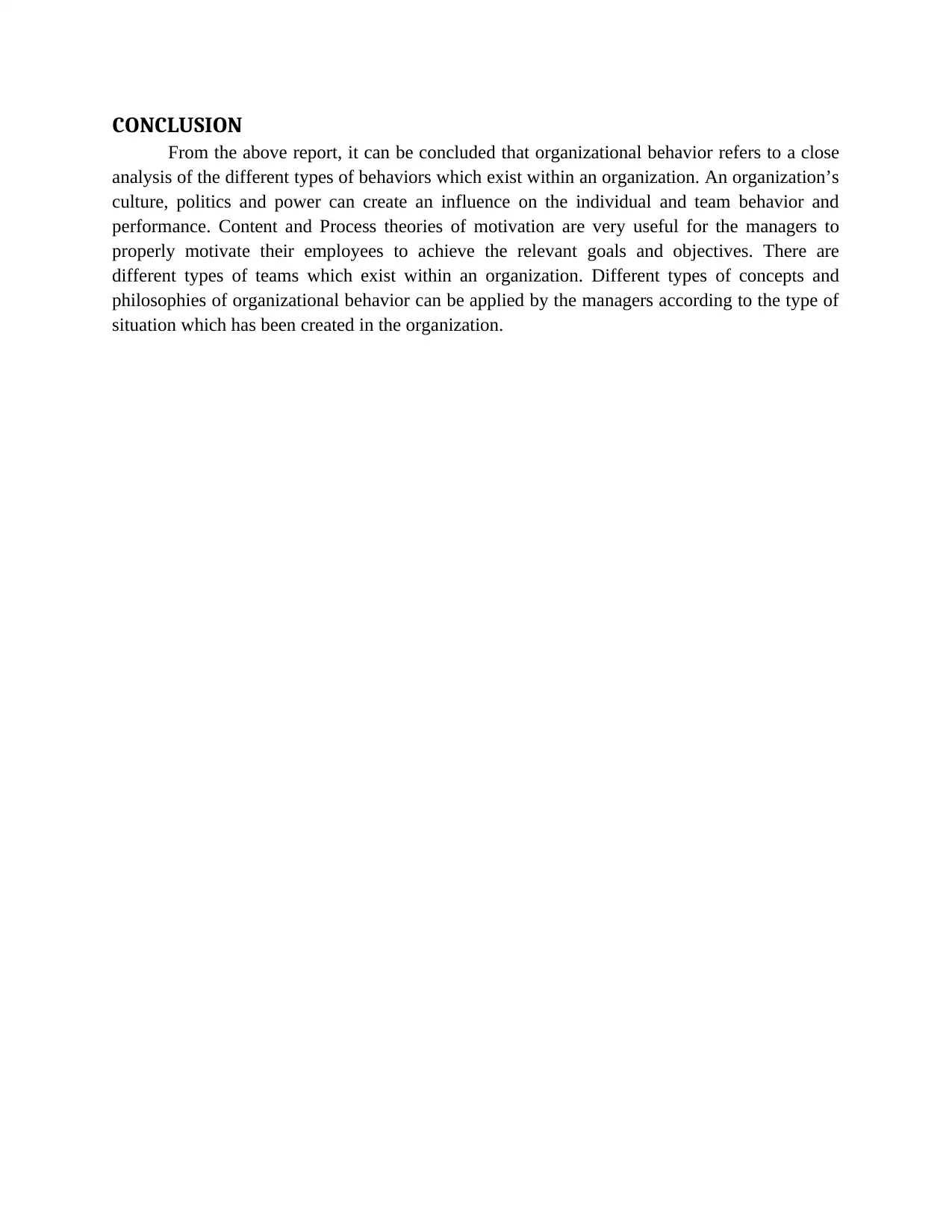
CONCLUSION
From the above report, it can be concluded that organizational behavior refers to a close
analysis of the different types of behaviors which exist within an organization. An organization’s
culture, politics and power can create an influence on the individual and team behavior and
performance. Content and Process theories of motivation are very useful for the managers to
properly motivate their employees to achieve the relevant goals and objectives. There are
different types of teams which exist within an organization. Different types of concepts and
philosophies of organizational behavior can be applied by the managers according to the type of
situation which has been created in the organization.
From the above report, it can be concluded that organizational behavior refers to a close
analysis of the different types of behaviors which exist within an organization. An organization’s
culture, politics and power can create an influence on the individual and team behavior and
performance. Content and Process theories of motivation are very useful for the managers to
properly motivate their employees to achieve the relevant goals and objectives. There are
different types of teams which exist within an organization. Different types of concepts and
philosophies of organizational behavior can be applied by the managers according to the type of
situation which has been created in the organization.
Secure Best Marks with AI Grader
Need help grading? Try our AI Grader for instant feedback on your assignments.
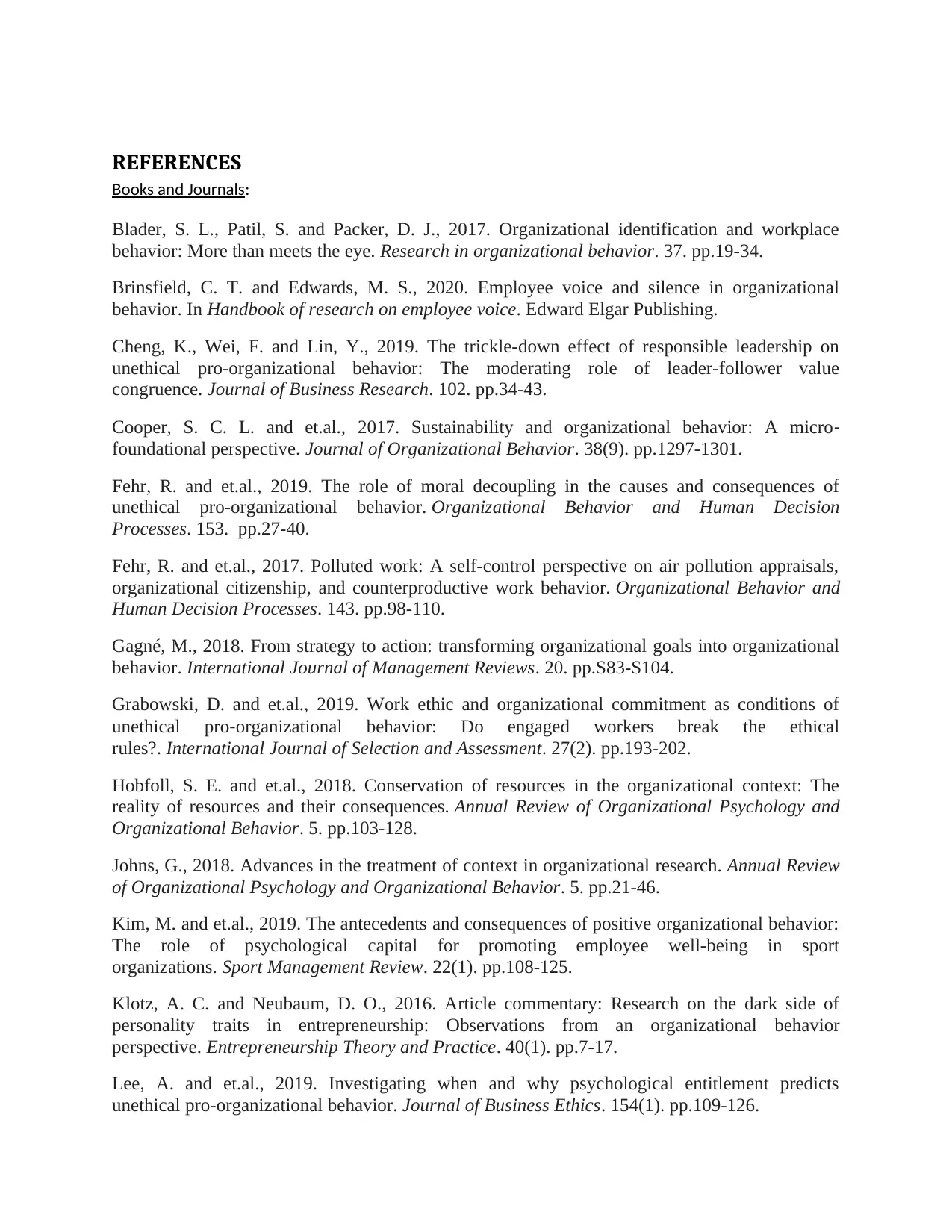
REFERENCES
Books and Journals:
Blader, S. L., Patil, S. and Packer, D. J., 2017. Organizational identification and workplace
behavior: More than meets the eye. Research in organizational behavior. 37. pp.19-34.
Brinsfield, C. T. and Edwards, M. S., 2020. Employee voice and silence in organizational
behavior. In Handbook of research on employee voice. Edward Elgar Publishing.
Cheng, K., Wei, F. and Lin, Y., 2019. The trickle-down effect of responsible leadership on
unethical pro-organizational behavior: The moderating role of leader-follower value
congruence. Journal of Business Research. 102. pp.34-43.
Cooper, S. C. L. and et.al., 2017. Sustainability and organizational behavior: A micro‐
foundational perspective. Journal of Organizational Behavior. 38(9). pp.1297-1301.
Fehr, R. and et.al., 2019. The role of moral decoupling in the causes and consequences of
unethical pro-organizational behavior. Organizational Behavior and Human Decision
Processes. 153. pp.27-40.
Fehr, R. and et.al., 2017. Polluted work: A self-control perspective on air pollution appraisals,
organizational citizenship, and counterproductive work behavior. Organizational Behavior and
Human Decision Processes. 143. pp.98-110.
Gagné, M., 2018. From strategy to action: transforming organizational goals into organizational
behavior. International Journal of Management Reviews. 20. pp.S83-S104.
Grabowski, D. and et.al., 2019. Work ethic and organizational commitment as conditions of
unethical pro‐organizational behavior: Do engaged workers break the ethical
rules?. International Journal of Selection and Assessment. 27(2). pp.193-202.
Hobfoll, S. E. and et.al., 2018. Conservation of resources in the organizational context: The
reality of resources and their consequences. Annual Review of Organizational Psychology and
Organizational Behavior. 5. pp.103-128.
Johns, G., 2018. Advances in the treatment of context in organizational research. Annual Review
of Organizational Psychology and Organizational Behavior. 5. pp.21-46.
Kim, M. and et.al., 2019. The antecedents and consequences of positive organizational behavior:
The role of psychological capital for promoting employee well-being in sport
organizations. Sport Management Review. 22(1). pp.108-125.
Klotz, A. C. and Neubaum, D. O., 2016. Article commentary: Research on the dark side of
personality traits in entrepreneurship: Observations from an organizational behavior
perspective. Entrepreneurship Theory and Practice. 40(1). pp.7-17.
Lee, A. and et.al., 2019. Investigating when and why psychological entitlement predicts
unethical pro-organizational behavior. Journal of Business Ethics. 154(1). pp.109-126.
Books and Journals:
Blader, S. L., Patil, S. and Packer, D. J., 2017. Organizational identification and workplace
behavior: More than meets the eye. Research in organizational behavior. 37. pp.19-34.
Brinsfield, C. T. and Edwards, M. S., 2020. Employee voice and silence in organizational
behavior. In Handbook of research on employee voice. Edward Elgar Publishing.
Cheng, K., Wei, F. and Lin, Y., 2019. The trickle-down effect of responsible leadership on
unethical pro-organizational behavior: The moderating role of leader-follower value
congruence. Journal of Business Research. 102. pp.34-43.
Cooper, S. C. L. and et.al., 2017. Sustainability and organizational behavior: A micro‐
foundational perspective. Journal of Organizational Behavior. 38(9). pp.1297-1301.
Fehr, R. and et.al., 2019. The role of moral decoupling in the causes and consequences of
unethical pro-organizational behavior. Organizational Behavior and Human Decision
Processes. 153. pp.27-40.
Fehr, R. and et.al., 2017. Polluted work: A self-control perspective on air pollution appraisals,
organizational citizenship, and counterproductive work behavior. Organizational Behavior and
Human Decision Processes. 143. pp.98-110.
Gagné, M., 2018. From strategy to action: transforming organizational goals into organizational
behavior. International Journal of Management Reviews. 20. pp.S83-S104.
Grabowski, D. and et.al., 2019. Work ethic and organizational commitment as conditions of
unethical pro‐organizational behavior: Do engaged workers break the ethical
rules?. International Journal of Selection and Assessment. 27(2). pp.193-202.
Hobfoll, S. E. and et.al., 2018. Conservation of resources in the organizational context: The
reality of resources and their consequences. Annual Review of Organizational Psychology and
Organizational Behavior. 5. pp.103-128.
Johns, G., 2018. Advances in the treatment of context in organizational research. Annual Review
of Organizational Psychology and Organizational Behavior. 5. pp.21-46.
Kim, M. and et.al., 2019. The antecedents and consequences of positive organizational behavior:
The role of psychological capital for promoting employee well-being in sport
organizations. Sport Management Review. 22(1). pp.108-125.
Klotz, A. C. and Neubaum, D. O., 2016. Article commentary: Research on the dark side of
personality traits in entrepreneurship: Observations from an organizational behavior
perspective. Entrepreneurship Theory and Practice. 40(1). pp.7-17.
Lee, A. and et.al., 2019. Investigating when and why psychological entitlement predicts
unethical pro-organizational behavior. Journal of Business Ethics. 154(1). pp.109-126.
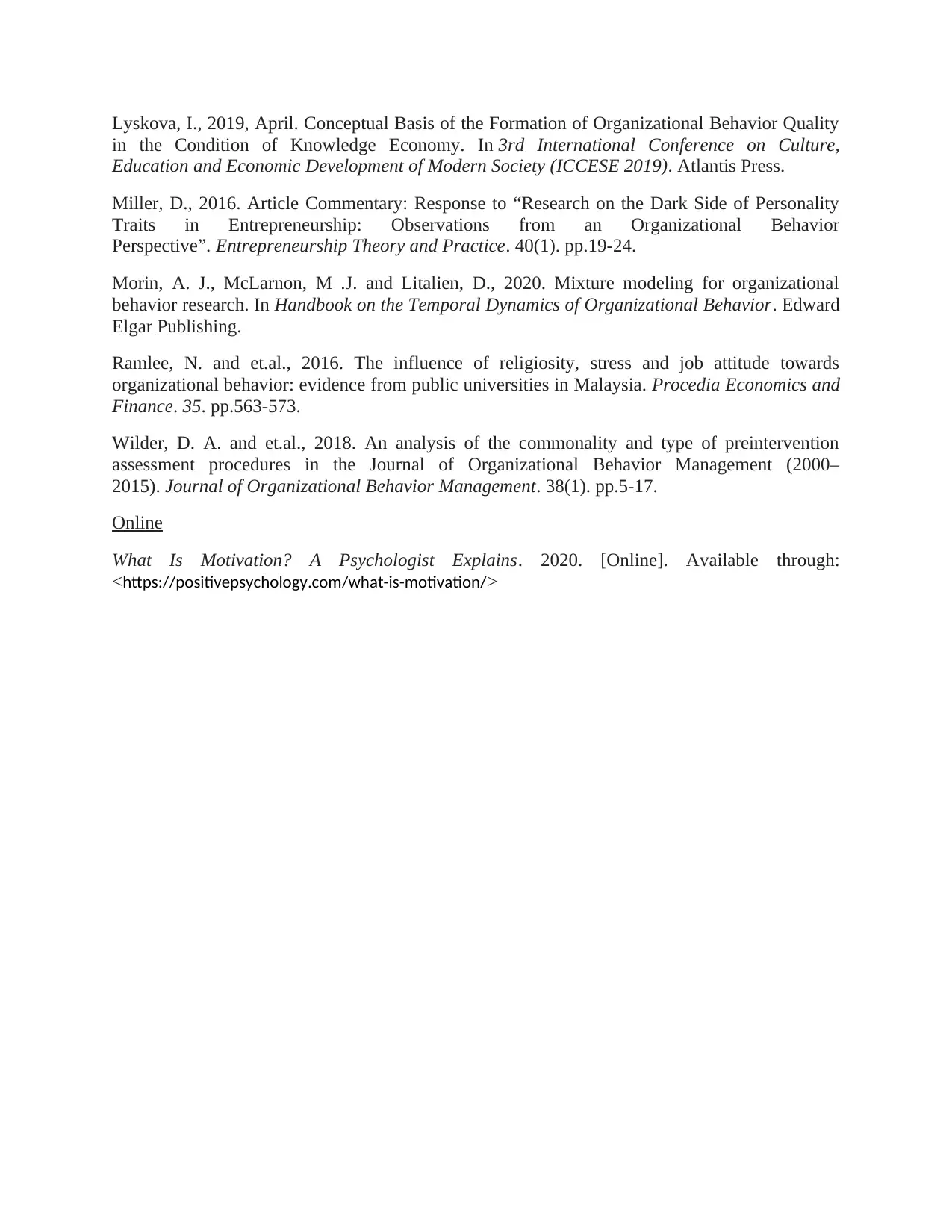
Lyskova, I., 2019, April. Conceptual Basis of the Formation of Organizational Behavior Quality
in the Condition of Knowledge Economy. In 3rd International Conference on Culture,
Education and Economic Development of Modern Society (ICCESE 2019). Atlantis Press.
Miller, D., 2016. Article Commentary: Response to “Research on the Dark Side of Personality
Traits in Entrepreneurship: Observations from an Organizational Behavior
Perspective”. Entrepreneurship Theory and Practice. 40(1). pp.19-24.
Morin, A. J., McLarnon, M .J. and Litalien, D., 2020. Mixture modeling for organizational
behavior research. In Handbook on the Temporal Dynamics of Organizational Behavior. Edward
Elgar Publishing.
Ramlee, N. and et.al., 2016. The influence of religiosity, stress and job attitude towards
organizational behavior: evidence from public universities in Malaysia. Procedia Economics and
Finance. 35. pp.563-573.
Wilder, D. A. and et.al., 2018. An analysis of the commonality and type of preintervention
assessment procedures in the Journal of Organizational Behavior Management (2000–
2015). Journal of Organizational Behavior Management. 38(1). pp.5-17.
Online
What Is Motivation? A Psychologist Explains. 2020. [Online]. Available through:
<https://positivepsychology.com/what-is-motivation/>
in the Condition of Knowledge Economy. In 3rd International Conference on Culture,
Education and Economic Development of Modern Society (ICCESE 2019). Atlantis Press.
Miller, D., 2016. Article Commentary: Response to “Research on the Dark Side of Personality
Traits in Entrepreneurship: Observations from an Organizational Behavior
Perspective”. Entrepreneurship Theory and Practice. 40(1). pp.19-24.
Morin, A. J., McLarnon, M .J. and Litalien, D., 2020. Mixture modeling for organizational
behavior research. In Handbook on the Temporal Dynamics of Organizational Behavior. Edward
Elgar Publishing.
Ramlee, N. and et.al., 2016. The influence of religiosity, stress and job attitude towards
organizational behavior: evidence from public universities in Malaysia. Procedia Economics and
Finance. 35. pp.563-573.
Wilder, D. A. and et.al., 2018. An analysis of the commonality and type of preintervention
assessment procedures in the Journal of Organizational Behavior Management (2000–
2015). Journal of Organizational Behavior Management. 38(1). pp.5-17.
Online
What Is Motivation? A Psychologist Explains. 2020. [Online]. Available through:
<https://positivepsychology.com/what-is-motivation/>
1 out of 15
![[object Object]](/_next/static/media/star-bottom.7253800d.svg)





